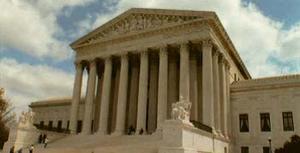Supreme Court: Humanitarian aid to terrorist organizations is illegal
Many terrorist organizations also provide basic services such as education, health, and welfare to the people they say they represent; since the corrupt and ineffective central governments do not provide such services, militant organizations step in to fill the void; those who send money to these organizations or provide other help argue that they aim to support the humanitarian activities of the these organizations, not their terror campaigns; the U.S. Supreme Court says this is a distinction without a difference; there is also no violation of the First Amendment here: “independently advocating for a cause is different from the prohibited act of providing a service to a foreign terrorist organization,” the Court ruled

Supreme Court has determined that any humanitarian aid to terrorist organizations is illegal // Source: umich.edu
One reason terrorist organizations such as Hamas, Hezbollah, the Kurdish PKK, and others enjoy a measure of support from the people is that they provide basic services — education, health, welfare — which the corrupt and ineffective governments of the countries or territories where they operate do not provide. Many in the West who contribute to these organizations argue that their contributions are meant to support the charitable work these organizations perform, not these organizations’ brutal terrorist campaigns.
The U.S. Supreme Court has rejected this argument. It has ruled that a law prohibiting “material support” to terrorist organizations also bans support intended for an organization’s humanitarian activities.
The case was brought by two individuals and six aid organizations, one of which is the Humanitarian Law Project, which provide support to the Partiya Karkeran Kurdistan (PKK) and the Liberation Tigers of Tamil Eelam (LTTE). The PKK wishes to establish an independent state for Kurds in Turkey. The LTTE seeks an independent homeland for the Tamils in Sri Lanka (the LTTE was crushed by a ruthless military assault by the Sri Lankan military, a campaign that left some 14,000 Tamil civilians dead and hundreds of thousands displaced).
Both of these groups do humanitarian work, but they are also designated as “foreign terrorist organizations” by the United States for their numerous terrorist attacks.
Teresa Anderson writes that the plaintiffs claimed that they want to support the peaceful activities of the PKK and LTTE. Specifically, they want to train members of these groups to use international law to resolve disputes peacefully and petition the UN. Under federal law, however, it is a crime knowingly to provide material support or resources to a foreign terrorist organization. The types of support prohibited by the law include “training,” “expert advice,” “service,” and providing “personnel.” The U.S. government contended that the plaintiffs’ activities fall under the prohibited areas and are illegal. The plaintiffs argue that the law violates the U.S. Constitution, in part because it impinges on First Amendment rights to freedom of speech and association.
In its ruling, the Court determined that the law does not violate the First Amendment. In its written opinion of the case, the Court noted that the law does not impede protected political speech. The Court writes that “independently advocating for a cause is different from the prohibited act of providing a service to a foreign terrorist organization.”
Plaintiffs also argued that the law, when applied to speech, should require proof of intent to support the foreign terrorist organization’s illegal activities. The Court also rejected this interpretation. The Court writes that “Congress chose knowledge about the organization’s connection to terrorism, not specific intent to further its terrorist activities, as the necessary mental state for a violation.”
The Court noted that it would be impossible to separate funds or activities designated for humanitarian purposes from those furthering terrorist action.
Also, the Court ruled that providing any support to such groups is tantamount to promoting terrorism. “The PKK and the LTTE are deadly groups. It is not difficult to conclude, as Congress did, that the taint of their violent activities is so great that working in coordination with them or at their command legitimizes and furthers their terrorist means,” wrote the Court.
